
Rivista Italiana delle Sostanze Grasse
Scope & Guideline
Advancing Knowledge in Organic Chemistry
Introduction
Aims and Scopes
- Olive Oil Quality and Processing:
The journal emphasizes studies on olive oil, including its extraction methods, quality assessment, and the impact of processing techniques on its properties. This includes research on factors affecting the quality of olive oil, such as geographical origin and cultivation practices. - Chemical Composition and Biological Activities:
Research on the chemical constituents of various oils, including essential oils, is a core focus. This includes studies on the bioactive compounds in oils and their potential health benefits, toxicity assessments, and antioxidant properties. - Innovative Analytical Techniques:
The journal features advancements in analytical methodologies for oil testing, including chromatographic techniques and chemometric analyses. These studies aim to improve the accuracy of oil quality assessments and ensure authenticity. - Sustainability and Environmental Impact:
Research addressing sustainable practices in oil production and processing, as well as the environmental aspects of oil and fat usage, is highlighted. This includes studies on organic farming practices and the impact of climate change on oil crops. - Nutritional Aspects of Oils and Fats:
The journal covers research related to the nutritional profiles of various oils, including their fatty acid compositions and health implications. This includes studies on the replacement of fats in food products and the health benefits of incorporating certain oils into diets.
Trending and Emerging
- Impact of Processing Technologies:
Recent studies increasingly focus on the effects of innovative processing technologies on oil quality, including the use of microwaves and other novel methods that enhance the extraction and preservation of bioactive compounds. - Health and Safety Assessments:
There is a growing interest in the safety and efficacy of oils, particularly in relation to their chemical composition and potential health impacts, including studies on cytotoxicity and allergenic responses. - Sustainable Practices in Oil Production:
Research emphasizing sustainability, including organic farming practices and the environmental impact of oil production, is gaining traction as the industry seeks to address ecological concerns. - Diversity of Oil Sources:
Emerging studies are exploring a wider variety of oil sources beyond traditional ones, such as essential oils from various plant species, reflecting a trend towards discovering new applications and benefits of less common oils. - Interdisciplinary Approaches:
There is a notable trend towards interdisciplinary research that combines elements of food science, agronomy, and biochemistry to provide a more comprehensive understanding of oils and their applications.
Declining or Waning
- Traditional Extraction Methods:
Research on traditional or historical methods of oil extraction has seen a decrease, as more emphasis is placed on innovative and efficient extraction technologies that enhance oil quality and yield. - General Agricultural Practices:
Studies focusing solely on broad agricultural practices without a direct connection to oil quality or composition are becoming less common. The journal is leaning towards more specialized research that ties agricultural techniques to specific outcomes in oil production. - Basic Nutritional Studies:
There is a noticeable reduction in basic nutritional studies of oils that do not explore advanced biochemical analyses or health impacts, as the field moves towards more complex and multifaceted approaches.
Similar Journals
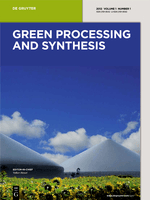
Green Processing and Synthesis
Pioneering Sustainable Practices in Chemical EngineeringGreen Processing and Synthesis, published by DE GRUYTER POLAND SP Z O O, stands as a vital open-access journal in the realms of Chemical Engineering, Environmental Chemistry, Fuel Technology, and more since its inception in 2012. With an impressive impact factor and currently ranked in the Q2 category across multiple domains, this journal plays a key role in disseminating cutting-edge research that addresses global sustainability challenges. The journal emphasizes innovative methodologies and sustainable practices that are crucial for advancing green technologies. Researchers, professionals, and students alike are encouraged to explore its extensive archive and contribute to the evolving conversation around environmentally conscious processing and synthesis techniques, all accessible freely since 2019.
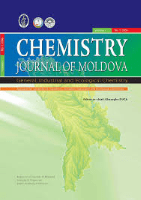
Chemistry Journal of Moldova
Innovative Insights: Shaping the Future of Environmental ChemistryChemistry Journal of Moldova is a pioneering open-access journal dedicated to fostering the dissemination of significant research in the diverse fields of chemistry, including Environmental Chemistry, Process Chemistry and Technology, and more. Published by the esteemed Academia Sciences Moldova, Institute of Chemistry, this journal has been at the forefront of scientific inquiry since its establishment in 2006. With an ISSN of 1857-1727 and a digital presence through its E-ISSN of 2345-1688, it provides an accessible platform for researchers, students, and professionals to share and engage with cutting-edge findings. Although currently ranked in the Q4 quartile in several chemistry categories, the journal is committed to improving its impact within the academic community and aims to highlight emerging trends and technologies in the chemistry domain. The journal's office is located at 3 Academiei Str, Chisinau MD-2028, Moldova. As it converges its publication years from 2016 to 2024, the Chemistry Journal of Moldova invites all contributors and readers to explore its rich repository of research that bridges innovative ideas to practical applications.

Journal of Food Measurement and Characterization
Transforming Food Science Through Rigorous MeasurementJournal of Food Measurement and Characterization, published by SPRINGER, is a pivotal resource for researchers and professionals in the fields of Chemical Engineering, Food Science, and Industrial and Manufacturing Engineering. With an ISSN of 2193-4126 and an E-ISSN of 2193-4134, this esteemed journal has carved its niche since its inception in 2012, continuing to contribute valuable insights until 2024. Ranking in the Q2 category across multiple disciplines, including Safety, Risk, Reliability, and Quality, it reflects a strong commitment to advancing knowledge and innovation within these critical areas. Although it operates under a subscription model, the journal provides an array of access options for institutions and researchers keen to explore novel methodologies and analyses in food measurement and characterization. The journal’s rigorous peer-review process ensures the dissemination of high-quality research, making it an essential platform for advancing the science of food and related industries.

Acta Scientiarum Polonorum-Technologia Alimentaria
Advancing Food Science Through Innovative ResearchActa Scientiarum Polonorum-Technologia Alimentaria, published by Poznan University of Life Sciences, is a revered journal in the field of food science, showcasing cutting-edge research and innovations in food technology. Established as a leading platform within its domain, this journal is indexed under Scopus and ranks in the 2023 Q3 quartile for Food Science, demonstrating its commitment to high-quality scholarship. With an ISSN of 1644-0730 and E-ISSN 1898-9594, it serves as a critical resource for researchers, professionals, and students seeking to stay at the forefront of advancements in food safety, quality control, and sustainable practices. The journal has also been recognized for its contributions to the agricultural and biological sciences, positioning itself at rank #205 out of 389 in this competitive field. While currently not offering open access, the journal's valuable insights and findings, especially as it publishes through 2024, play a crucial role in advancing knowledge and fostering collaboration among experts in the food science sector.
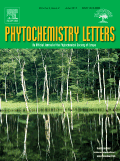
Phytochemistry Letters
Unveiling cutting-edge discoveries in phytochemistry.Phytochemistry Letters, an esteemed journal published by ELSEVIER, serves as a significant platform for the dissemination of cutting-edge research in the fields of agronomy, biotechnology, and plant science. With an ISSN of 1874-3900 and an E-ISSN of 1876-7486, this journal is recognized for its rigorous peer-review process and commitment to scientific excellence. Currently ranked in the Q3 quartile in Agronomy and Crop Science and Plant Science, and Q4 in Biochemistry, Phytochemistry Letters encompasses a wide range of topics critical to understanding the biochemical processes in plant systems. Researchers will find valuable insights that bridge the gaps between plant biochemistry and agricultural application, fostering innovation and sustainability. Given its solid position in Scopus rankings, particularly in Plant Science and Agronomy, the journal offers both open access and subscription options, ensuring wider reach and impact of published studies. The journal's ongoing contributions are vital for advancing knowledge and addressing contemporary challenges in phytochemistry, making it an indispensable resource for scholars, professionals, and students alike.
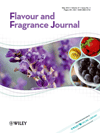
FLAVOUR AND FRAGRANCE JOURNAL
Advancing Knowledge in Aroma and TasteThe FLAVOUR AND FRAGRANCE JOURNAL, published by WILEY, is a prestigious academic periodical dedicated to the interdisciplinary study of flavour and fragrance chemistry. With a commendable impact factor and ranked Q2 in both the Chemistry (miscellaneous) and Food Science categories, this journal plays a pivotal role in disseminating innovative research that enhances our understanding of sensorial experiences. Established in 1985, it continues to serve as a vital platform for scientists, industry professionals, and scholars who are engaged in the exploration of aromas and flavours, thereby fostering advancements in food science, sensory analysis, and product development. Although it is not an open-access journal, the high visibility and notable contributions reflect its significant standing in the academic community, encouraging discourse and collaboration among its readership. Researchers and students alike will find invaluable insights and cutting-edge studies that push the boundaries of flavour and fragrance research within its pages.

Acta Chimica Slovaca
Bridging Theory and Application in ChemistryActa Chimica Slovaca is a prominent peer-reviewed journal dedicated to advancing the field of chemistry, focusing on high-quality research and innovative studies across various chemical disciplines. Published by SCIENDO, this journal aims to provide a platform for researchers, professionals, and students to disseminate their findings, share insights, and foster collaboration in the vibrant scientific community. With an ISSN of 1337-978X and an E-ISSN of 1339-3065, Acta Chimica Slovaca is recognized for its commitment to the integrity and rigor of research publication. Although specific metrics such as H-index and impact factor were not provided, the journal's alignment with international standards and open access principles emphasizes its goal of maximizing the visibility and accessibility of chemical research. Articles published in this journal cover a broad scope, facilitating comprehensive discussions on theoretical, experimental, and applied aspects of chemistry, thus playing a crucial role in the ongoing education and development of the next generation of chemists.

Food Chemistry-X
Advancing the Science of Flavor and Safety.Food Chemistry-X is a premier open-access journal published by Elsevier, dedicated to advancing the field of food chemistry through high-quality research and comprehensive reviews. With its ISSN of 2590-1575, the journal has gained significant attention since adopting an open-access model in 2019, allowing wide dissemination of knowledge and innovations in food science. Based in the United Kingdom, it holds prestigious Q1 rankings in both Analytical Chemistry and Food Science categories as of 2023, positioning itself as a leading platform for researchers worldwide. The journal's focus spans extensive topics within food chemistry, including food safety, nutritional analysis, and the chemical properties of food, offering insights that are crucial for addressing contemporary challenges in food production and consumption. With a Scopus rank placing it in the 65th percentile among the top journals in Food Science and the 58th percentile in Analytical Chemistry, Food Chemistry-X is an essential resource for academics, professionals, and students seeking to stay at the forefront of research and innovation in this vibrant field.

Turkish Journal of Field Crops
Driving Agricultural Innovation in Turkey and BeyondTurkish Journal of Field Crops is a prestigious peer-reviewed publication dedicated to advancing the field of agronomy and crop science, published by the Society of Field Crop Science. With an ISSN of 1301-1111, this journal serves as a crucial platform for researchers and professionals to disseminate innovative findings and discuss practical applications in crop cultivation and management. Hailing from Turkey, it aims to address the pressing challenges facing agriculture in both regional and global contexts, particularly over its converged years from 2009 to 2024. As a Q3 ranked journal in the Agronomy and Crop Science category with a Scopus ranking of #259/406 and a percentile of 36th, it fosters high-quality research that contributes to the sustainable development of field crops. Though it operates under various access options, this journal is committed to providing valuable insights into agronomic practices, aiming to bridge the gap between theory and application for scientists, educators, and practitioners alike.
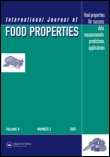
INTERNATIONAL JOURNAL OF FOOD PROPERTIES
Advancing knowledge in food science.INTERNATIONAL JOURNAL OF FOOD PROPERTIES, published by TAYLOR & FRANCIS INC, is a leading platform for disseminating high-quality research in the field of food science. With an ISSN of 1094-2912 and E-ISSN of 1532-2386, this journal has been committed to open access since 2018, ensuring that groundbreaking studies are readily available to global audiences. The journal has steadily gained recognition for its contribution to the discipline, achieving a Q2 ranking in Food Science and placing in the 68th percentile among its peers according to Scopus metrics. Covering a wide array of topics related to the properties and applications of food, it serves as a valuable resource for researchers, professionals, and students alike. With coverage extending from 1998 to 2024, the journal continually seeks to advance knowledge and foster innovation within the food science community, making it a pivotal publication for anyone serious about this vital field.